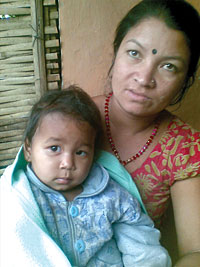 GOPAL GARTAULA MATERNAL INSTINCT: Debimaya with Angela, the baby she adopted after she was abandoned in her refugee camp two-and-half years ago. But because of Angela, Debimaya's acceptance for third-country resettlement is being delayed. |
Two-and-half years ago, at dusk, two young women came into the hut of Debimaya Sarki. One of them, who looked barely 14, was carrying a newly born baby. They said they were from Ilam and had come down to Jhapa for medical treatment, they needed somewhere to stay for the night. Debimaya willingly took them in, and since she had to cook for her two children anyway, she added extra rice for the guests.
The next morning, the women were nowhere to be seen, and their newly-born baby was crying in the cot. Debimaya waited for the women to return, but they never did.
The 43-year-old Debimaya is a refugee from Bhutan along with her husband, Omnath, and two children, 10-year-old Jibesh and four-year-old daughter Apsan. They have been living in one of the tiny bamboo huts within the Timai Refugee Camp in eastern Nepal for the past 20 years ever since the couple was forced out of Bhutan.
Debimaya named the abandoned baby Angela, and she treats the two-and-half year old girl as her own. "Angela is mine now," she says, "I don't know who they were, but they left their baby with me, it is my duty to take care of her." Neighbours and others have come to ask Debimaya for the baby, but she refused to give her away.
The irony of the story is that instead of being praised and rewarded for giving refuge to an abandoned child, Debimaya's family is being punished. The fact that she has an adopted daughter for whom she has no papers is delaying her family's processing for third-country resettlement.
Of the 94,000 Bhutan refugees eligible for third-country resettlement, 44,000 have already been sent, mostly to the United States but also to Australia, New Zealand, Norway, the Netherlands and Canada. But there are families like Debimaya's facing delays due to adoptions, marriages to Nepalis or lack of proper documentation.
Says Debimaya's friend and neighbour, Ranmaya Darji: "She loves Angela like her own children, it was fate that brought this child to Debimaya's family."
Gopal Gartaula in Jhapa


